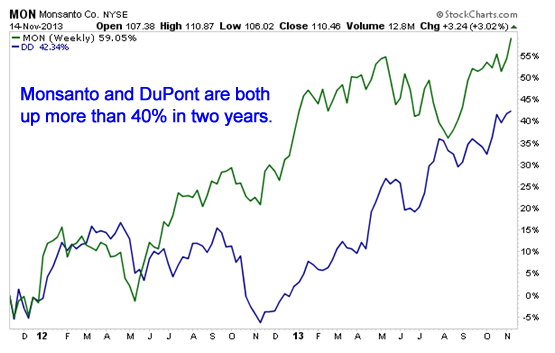The Food and Drug Administration (FDA) has the ability to make or break companies.
As the leading regulator of the domestic food and drug industries, the FDA has rulings that can send one company's share price soaring and another's crashing at the same time.
That's why one recent announcement from the closely followed agency was so important.
In an attempt to combat heart disease, the FDA said it was on a clear path to banning hydrogenated oils, one of the primary components of trans fats.
In the short run, that is a big threat to the soybean industry, potentially impacting close to 4 million acres of annual production. But in the long run, it sets the stage for a whole new class of FDA compliant soybeans.
The soybean industry is lobbying regulators to approve a new class of soybeans called high-oleic that will meet the new regulatory standards. If the approval comes through, the United Soybean Board projects compliant bean production will accelerate to 18 million acres by 2023, almost 25% of 2013's projected yield of 76 million acres.
The birth of a new soybean market is creating a big opportunity for two global leaders in seeds.
Not only are these companies the only two in the world with the technology available to make these compliant seeds, they are protected from new competition by huge barriers to entry and enjoy high margins because of their coveted intellectual property. That has already fueled big gains in the last two years.
Let's take a closer look at these two market leaders.

Monsanto (NYSE: MON)
Monsanto is already a global leader in seeds and pesticides with a market cap of $58 billion.
Its global and industry leading genetic technology has given it a big edge in the seed market. Its portfolio of genetically enhanced seeds offer huge benefits to farmers, including resistance to the sun, extreme weather conditions and insects while also boosting yields.
Monsanto's dominant presence in the seed market and industry-leading genetic technology puts it in the perfect position to capitalize on the FDA's intentions to ban trans fats.
The company's response to a shift away from trans fat is Vistive Gold, a genetically enhanced soybean that is lower in polyunsaturated fat. Monsanto views its new enhanced soybean as a window into the future of the industry, with biotech research and development (R&D) fueling healthier alternatives. Vistive Gold received domestic approval in the summer of 2012, and with other global approvals pending, Monsanto expects a full launch in 2014.
The consensus estimates for Monsanto going forward stand at 14% earnings growth in fiscal 2014, 17% growth in 2015 and average annual earnings growth of 14% in the next five years. Monsanto also carries a respectable 1.6% dividend.
Monsanto is exactly the type of company my colleagues at StreetAuthority.com feature in their Top 10 Stocks for 2014 report. Dominance in the marketplace, dividends and stock buybacks are just three of the features these powerhouses have. And that's not all: One stock has raised its dividend 36 times since 2004, while another has boosted its dividend a whopping 183% since 2011. Learn more here.
DuPont (NYSE: DD)
DuPont is also a global leader in the seed and agriculture business with a market cap of $57 billion.
As one of the few companies that can compete with Monsanto's genetic technology, DuPont is also making moves to cash in on the death of trans fats.
That comes in the form of Plenish, a high oleic soybean designed as an alternative to traditional beans.
Although Plenish was approved in 2010, the growing industry shift away from traditional beans is fueling sales. In early November, Archer Daniels Midland (NYSE: ADM) announced it would double its acreage contracted for Plenish in 2014. ADM plans on marketing the high oleic soybean oil to the food industry by 2015.
That puts DuPont on the forefront of a long-term shift in agriculture production and the ingredients food companies are using to develop food products.
Looking forward, DuPont is on pace to grow earnings 15% in 2013, 13% in 2014 and 9% annually in the next five years. DuPont also looks strong on the income front, with a dividend yield of 2.9%.
Risks to Consider: Monsanto has been the target of global protests in the last month because of its use of genetic technology. Although that hasn't had any material impact on earnings, it could impact capital inflows into its stock.
Action to Take --> Monsanto and DuPont are in position to capitalize on regulatory changes from the FDA that are going to give birth to a whole new class of soybeans. But there is one big difference between the two companies. Monsanto is more of a pure play on seeds with a higher percent of its revenue derived from this segment. DuPont's seed and agriculture business is one of a number of industries the company is involved in. That gives Monsanto better operating leverage against trends in global agriculture production and a shift into genetically modified soybeans.



